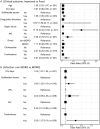Characterization of Pancreatic Infections in Patients with Severe Acute Pancreatitis: A Retrospective Study from 2019 to 2023
- PMID: 39816241
- PMCID: PMC11734511
- DOI: 10.2147/IDR.S500916
Characterization of Pancreatic Infections in Patients with Severe Acute Pancreatitis: A Retrospective Study from 2019 to 2023
Abstract
Objective: This study investigated the distribution and changes in pancreatic infections among patients with acute pancreatitis (AP) from 2019 to 2023, while exploring the impact of multidrug-resistant bacterial infections on the prognosis of patients with poor outcomes.
Methods: This study included patients diagnosed with SAP between 2019 and 2023 and collected the demographic and clinical characteristics of all participants. Based on routine clinical microbiological culture results, the distribution and drug resistance of pathogens associated with pancreatic infections were analyzed. Multivariable logistic regression was used to evaluate the association between multidrug-resistant organism (MDRO) infection and poor prognosis.
Results: A total of 1586 pancreatic fluid specimens were analyzed and collected from 843 patients diagnosed with AP. The positive rate of the culture results was 81% (1280/1586), with the predominant pathogens identified as Klebsiella pneumoniae, Pseudomonas aeruginosa, Enterococcus faecium, and Acinetobacter baumannii complex. Of the 843 patients, 756 met the criteria, and the proportion of MDROs in pancreatic infections was 87.57% (662/756). Multivariate logistic regression analysis revealed that septic shock, acute kidney injury, and tracheostomy were associated with a poor prognosis, whereas ICU length of stay, infected pancreatic necrosis, and tracheostomy were associated with multidrug-resistant bacterial infections in patients with severe or critical AP.
Conclusion: The proportion of MDRO infections in patients with severe or critical AP was notably high, primarily involving multidrug-resistant Klebsiella pneumoniae, Pseudomonas aeruginosa, and Acinetobacter baumannii. Septic shock, acute kidney injury, and tracheostomy have been identified as independent risk factors of poor prognosis in patients with severe or critical AP.
Keywords: microbiological profiles; multidrug-resistant organism; pancreatic infection; risk factor; severe acute pancreatitis.
© 2025 Chen et al.
Conflict of interest statement
The authors report no conflicts of interest in this work.
Figures




Similar articles
-
Infectious Complications in Severe Acute Pancreatitis: Pathogens, Drug Resistance, and Status of Nosocomial Infection in a University-Affiliated Teaching Hospital.Dig Dis Sci. 2020 Jul;65(7):2079-2088. doi: 10.1007/s10620-019-05924-9. Epub 2019 Nov 5. Dig Dis Sci. 2020. PMID: 31691173
-
[Microbiological characteristics of patients with severe burns caused by blast and application of meta- genomics next-generation sequencing in the detection of pathogenic microorganisms].Zhonghua Shao Shang Za Zhi. 2021 Oct 20;37(10):946-952. doi: 10.3760/cma.j.cn501120-20201017-00440. Zhonghua Shao Shang Za Zhi. 2021. PMID: 34689464 Free PMC article. Chinese.
-
Clinical Characteristics of Acute Pancreatitis Patients with Multidrug-Resistant Bacterial Infection.Infect Drug Resist. 2022 Mar 31;15:1439-1447. doi: 10.2147/IDR.S354347. eCollection 2022. Infect Drug Resist. 2022. PMID: 35386293 Free PMC article.
-
A Systematic and Critical Review of Bacteriophage Therapy Against Multidrug-resistant ESKAPE Organisms in Humans.Clin Infect Dis. 2019 Jun 18;69(1):167-178. doi: 10.1093/cid/ciy947. Clin Infect Dis. 2019. PMID: 30395179
-
Multidrug-Resistant and Virulent Organisms Trauma Infections: Trauma Infectious Disease Outcomes Study Initiative.Mil Med. 2022 May 4;187(Suppl 2):42-51. doi: 10.1093/milmed/usab131. Mil Med. 2022. PMID: 35512375 Free PMC article. Review.
Cited by
-
Identification and characterization of bile microbiota in patients with biliary obstructive diseases using next-generation sequencing of 16S rRNA and ITS.Front Cell Infect Microbiol. 2025 Apr 7;15:1575824. doi: 10.3389/fcimb.2025.1575824. eCollection 2025. Front Cell Infect Microbiol. 2025. PMID: 40260116 Free PMC article.
References
LinkOut - more resources
Full Text Sources
Miscellaneous

